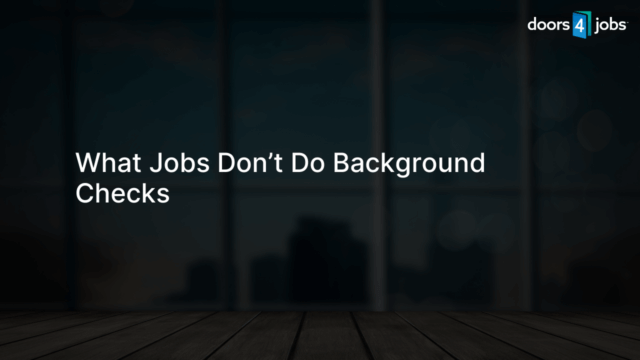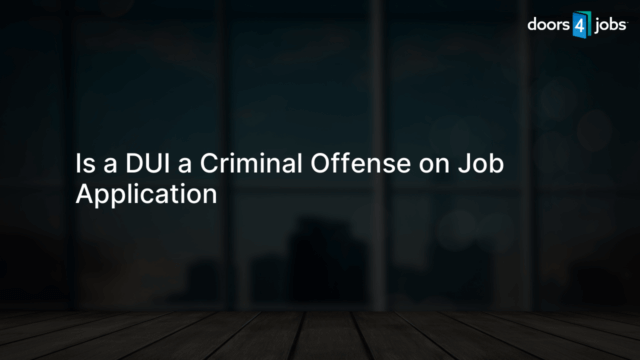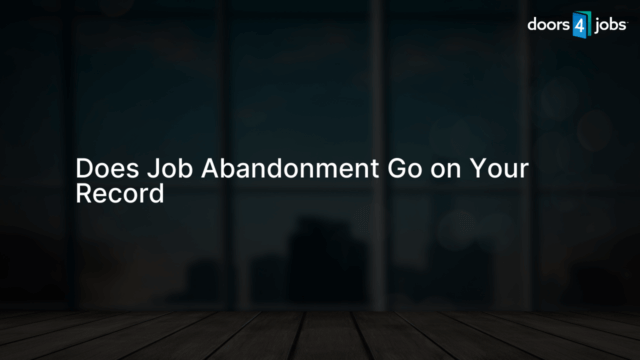In a background check for a job, employers primarily verify your identity, employment history, education, criminal records, credit history, driving records, and references. It helps them assess your trustworthiness, qualifications, and compatibility for the position.
Introduction to Background Checks
A background check is an essential step in the hiring process, allowing employers to verify the claims made by a candidate and assess their overall suitability for a job. This blog post will discuss key components of a background check and what employers typically consider when assessing job applicants.
Identity Verification
Employers want to ensure you are who you claim to be, so they often start with identity verification. This process usually involves confirming your full name, date of birth, and Social Security number. Identity verification also helps protect organizations from hiring individuals with false or stolen identities.
Employment History
A background check will often include employment history verification. Employers use this information to confirm that you have actually worked at the organizations you listed on your resume, gather details on your job titles, and determine your dates of employment.
Education Records
Verification of your education records helps the employer validate your educational achievements, such as degrees or certifications. This includes confirming dates of enrollment, attendance, and graduation from the institutions you’ve listed.
Criminal Records
One important aspect that employers consider is the candidate’s criminal record. They are particularly interested in knowing about any past convictions, arrests, or offenses that may pose a risk to the organization or violate company policies. Bear in mind that some jurisdictions limit the types of criminal information that can be used for employment decisions.
Credit History
For certain positions, particularly in finance or those with access to sensitive financial information, employers may review your credit history. This provides insight into how you handle financial responsibilities and can be an indicator of an individual’s overall trustworthiness and reliability.
Driving Records
If the job you’ve applied for involves driving in any capacity, your driving records might be reviewed. Employers may look for driving licenses and check for violations, suspensions, or a history of accidents to understand if you are a responsible driver and evaluate potential risks.
Reference Checks
Last but not least, employers usually reach out to the references you provided on your application. By speaking to your previous supervisors or coworkers, they hope to get a better understanding of your work ethic, performance, and interpersonal skills. Having strong, professional references can strengthen your application and increase your chances of being hired.
Additional Screening Components
Depending on the specific job requirements and industry, employers might conduct additional screenings during a background check. Some of these supplementary components can include:
Professional License Verification
If the job requires a specific professional license, such as in healthcare or law, employers often verify the validity of such licenses. They will check the license status, issue date, and any disciplinary actions or restrictions that may apply.
Drug Screening
In certain industries, such as transportation and healthcare, drug testing may be mandatory for safety reasons. Employers may require a pre-employment drug test to ensure candidates are not using illegal substances that could compromise their performance or create hazardous working conditions.
Social Media Screening
Employers may also look at your social media profiles to assess your online behavior and gain insights into your personality. Controversial posts or comments, signs of discrimination, or inappropriate content may negatively affect your application.
Understanding Your Rights
During the background check process, it is important to be aware of your rights to ensure that employers treat your information fairly and accurately. In the United States, the Fair Credit Reporting Act (FCRA) provides a set of guidelines that employers and screening agencies must follow when conducting background checks:
Written Consent
Employers must obtain your written consent before conducting a background check. You have the right to review the report and correct any inaccuracies or outdated information within the report.
Adverse Decision Notice
If an employer decides not to hire you based on the results of your background check, they are required to provide you with an adverse decision notice, a copy of the background check report, and information on your rights under the FCRA. This helps you understand why the decision was made and gives you an opportunity to correct any inaccuracies.
Equal Employment Opportunity
Furthermore, employers must adhere to equal employment opportunity laws, which prohibit discrimination based on race, national origin, sex, age, disability, or any other protected characteristic. These laws ensure that applicants are evaluated fairly and consistently based on their qualifications and relevant experience.
Preparing for a Background Check
Being prepared for a background check can help you get through the process smoothly and increase your chances of landing the job. Here are a few tips:
- Be honest on your application and during interviews.
- Verify the employment dates and job titles on your resume.
- Know your previous employers’ contact information and your school’s registrar details.
- Inform your references that they might be contacted.
- Clean up your social media profiles of any unprofessional content.
FAQ Section
In this section, we answer some frequently asked questions related to background checks for jobs. Use this information to better understand the process and how it affects your job application.
How long do background checks take?
Background checks can typically take anywhere between a few days to a few weeks. The exact duration depends on the complexity of the screening, the type of information requested, and the responsiveness of institutions (e.g., past employers, educational institutions) being contacted.
Can I get a job with a criminal record?
It is possible to get a job with a criminal record, as employers consider various factors like the nature of the offense, the time elapsed, and job-relatedness when evaluating an applicant. However, some positions, especially those involving public trust or safety, may have more stringent requirements regarding criminal histories.
Do all employers run background checks?
Not all employers run background checks, but it is a common practice, especially in larger organizations and regulated industries. Employers may choose to run background checks based on the nature of their business, the job’s responsibilities, or legal requirements.
What if there are inaccuracies in my background check report?
If inaccuracies appear in your background check report, you have the right to dispute them with the screening agency and request a correction. Under the Fair Credit Reporting Act (FCRA), you are entitled to receive a copy of the report, allowing you to review and correct any outdated or incorrect information.
How can I prepare for a background check for a job?
Preparing for a background check involves verifying the information on your resume, being honest about your employment history and qualifications, informing your references ahead of time, and reviewing your social media profiles for any unprofessional content. It’s also a good idea to familiarize yourself with your rights under the relevant laws, such as the FCRA.











